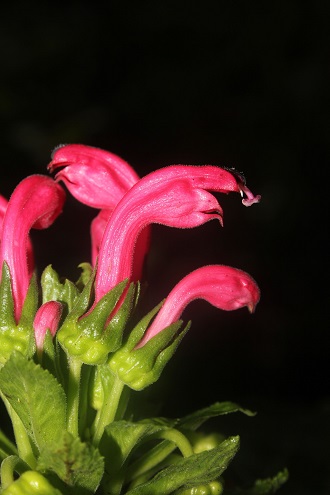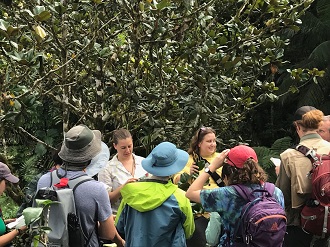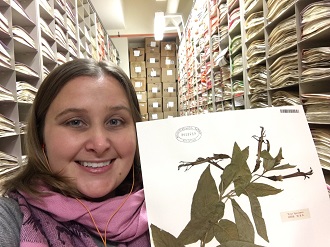About the department: I'm in a very large, broad biology department at LSU. One of our departmental strengths is in systematics and museum-based research. In addition to running my own lab, I am one of a handful of faculty curators: I am Director of the Shirley C. Tucker Herbarium, a collection of ca. 400,000 plant, fungus, and lichen specimens.
About the research: Our lab's research focuses on the origin and maintenance of Neotropical plant biodiversity, especially in the tropical Andean mountains, the World’s most species-rich biodiversity hotspot. We are particularly interested in the relative importance of abiotic (e.g., mountain uplift) and biotic (e.g., hummingbird pollination) factors in explaining patterns of species diversity. Integrating across scales, we use phylogenetic studies incorporating hundreds of species to inform ecological and microevolutionary investigations at or below the species level. Natural history collections are essential to our research; we extract genomic, phenotypic, and environmental data from their specimens.
What has been the biggest challenge as a new PI so far? The biggest challenge, by far, of being a new PI is balancing all of the responsibilities and expectations that I now bear. On any given day, I am a scientist; a teacher; a financial planner; a museum curator; pest management; a strong-handed boss; a compassionate mentor; a public speaker; a grant writer; an editor; a PR professional; a plant expert for my local community; and someone in search of, or able to lend, a sympathetic ear. I didn't appreciate how much time I had to sit and think as a graduate student and postdoc!
What has been the biggest surprise so far about being a new PI? My lab has taken on a life of its own! The "LagoLab" has its own identity, very little of which I am actually responsible for.
How do you/will you approach mentoring new lab members? It quickly became clear that I need to be a very flexible mentor in order to lead a happy, diverse, productive lab. It takes me about a semester to understand how to best work with a new lab member: are they motivated by deadlines, or do they thrive when I give them space? What skills would they most benefit from building, and what opportunities would help them meet these goals? What seems to really get them excited, and does this match what they say their passion is (nb: it often doesn't!)? Once I know the lab member well enough, I am able to provide an individualized mentoring program that helps them reach their goals, whether those are similar to my own or not.
Are you recruiting? If so, how do you/ will you choose new lab members? Even though I'm not actively recruiting at the moment, I'm always looking for motivated, excited students to join the lab! Demonstrated research experience and the ability to discuss scientific interests at a high level is important, but so is being a kind person who will fit in well with the current lab.
When and why did you become a SSE member? As a graduate student, I mainly belonged to botany-oriented societies. I joined SSE as a postdoc to expand my community to include a broader base of scientists.
When was your first Evolution Meeting, and how did it affect your career? Believe it or not, my first Evolution meeting was not until 2016 in Austin, TX. Even as an extroverted postdoc, I was pretty intimidated by the number of famous, familiar names in attendance—but it turns out the Evolution community is just as friendly as the Botany community! I ended up winning the Ernst Mayr Prize from the Society of Systematic Biologists that year, which I think put me on people's radars faster than would have happened otherwise.
Do you remember your first publication in Evolution or Evolution Letters (acceptance or rejection)? My first
Evolution publication was "Repeated evolution of vertebrate pollination syndromes in a recently diverged Andean plant clade," the last chapter of my PhD dissertation. I was so chuffed to publish in this highly respected venue, and was very impressed with the peer review process (hats off to AE extraordinaire, Stacey Smith!). This paper was published the same week that I started my faculty position, and a colleague forwarded me the journal contents with the note, "A classy entrance!". That meant a lot.
Besides research, how do you promote science? As the LSU herbarium director, an important part of my job is advocating for natural history collections. I do this in many ways: participating in outreach activities for children or for the general audience; serving on Society committees that dedicate resources to in-need herbaria; participating in working groups focused on extending the reach of collections; and, of course, publishing research that incorporates data from herbaria!
How do you think evolutionary research benefits society? In the middle of the COVID-19 outbreak, the importance of evolutionary research is crystal clear. Like many, I've been using
https://nextstrain.org/ to track the evolution of the SARS-COV-2 virus.
Do you have a time management tip to share? I have found two time management techniques that work for me. The first is the Pomodoro method: work for 25 minutes, take a 5 minute break, repeat. I often find that I only need to get a couple under my belt before I hit my own groove. I'm also part of a small accountability group with other pre-tenure women. In our twice-weekly meetings, we state our goals and allow ourselves to chat for a short time, and then spend 2 hours actually writing. Sometimes, it's the only 4 hours of writing I do in a given week!
What is your favorite app? My lab would not run without Slack.
Outside of work, I use the NY Times Crossword and iNaturalist apps frequently. I'm also learning bird calls during this COVID-19 social distancing period, and finding the Merlin Bird ID app invaluable toward this goal.
Do you have a favorite science podcast or blog? In Defense of Plants and Ologies
What one piece of advice would you give to a starting graduate student? Take as much time as you can in your first year of graduate school to read the literature broadly and become familiar with the core questions and concepts of your subfield. And don't be discouraged if you don't know what your project will be or you don't know how to run so-and-so analysis; you'll get there.
What one piece of advice would you give to a postdoc? I encourage beginning postdocs to do some soul searching about their career goals. Is an R1 faculty job really what you want, or is it what you think you are expected to want? I love my faculty job, but they can be hard to come by and it takes a type (see my answer to the first question above). There are so many other careers a PhD prepares you for, many of which are higher paying and/or less stressful: an industry job, a collections manager or curator in a natural history collection, a research coordinator at a non-profit, etc. There is no shame in actively seeking these out if you think you will find more joy in them than a faculty position. If you do want a faculty job, work on developing the "Publications" and "Research Funding" sections of your CV.
How was your first faculty meeting? It was pretty uneventful. We are a huge department, so we meet in a large lecture hall and it felt more like a class than a participatory meeting.
Did you ever have something go wrong in a talk? I hate to think back to my very first talk as an undergraduate intern in the Research Training Program at the Smithsonian's National Museum of Natural History. I'm not sure how, but I managed to insert a car crash animation into one of my results slides some time after my last practice talk but before the real deal. I was mortified when it played unexpectedly— with sound effects!— during my Very Serious Talk to a room full of my friends and, worse yet, curators!
What is something most people don’t know about you?I'm a native English speaker, but speak Spanish at home with my Costa Rican husband.
What do you enjoy doing in your free time? I love crossword puzzles, practicing plant identification in my yard or with iNaturalist, and long walks under Louisiana's dramatic evening skies with my yellow lab, Rocoto– maybe while sipping a local craft beer.
 Laura Lagomarsino
Laura Lagomarsino

